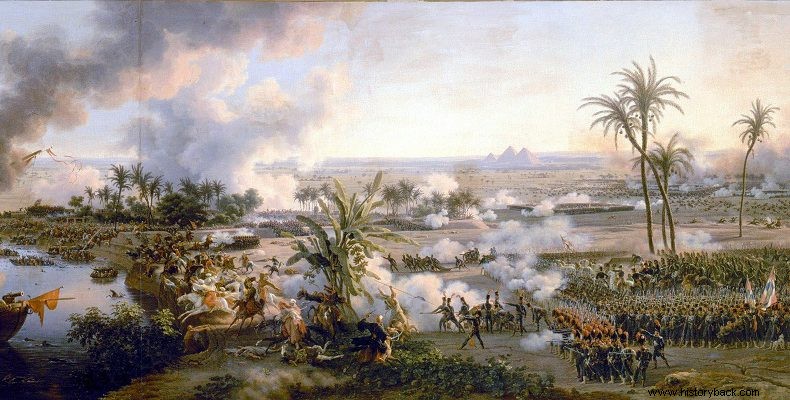
The colonel of the French army Nikolaos Papazoglou is one of the most interesting, but also the most enigmatic figures of modern Greek history. His real name is unknown. The origin of his family from Cesme in Asia Minor gave him the surname Chesmelis. But Nicholas was the son of a priest.
Thus the Turks called him Papazoglou (papa-oglan =papa's child). He was once known by the name Hatjinikolas, while Napoleon called him Papadopoulos or simply Colonel Nicolas. He was born on August 15, 1758. His family was quite wealthy and his father Stamatios Chesmelis was also a shipowner. Nikolaos started traveling from a very young age.
An enigmatic personality
In 1779 he was in the Peloponnese and joined the service of the Turks, who were then fighting the Turkalvans who had rebelled in Moria. Then Nicholas participated in the Turkish campaign against the Memelukes of Egypt in 1785. The Turks captured the Mameluke Osman Bey and imprisoned him in Constantinople.
On the ship that carried Osman to the City was also Nicholas, who formed a friendly relationship with the prisoner, whom he finally freed one night from prison and together with other Mamluk prisoners put in a boat in which he sailed to Egypt. As a reward the Mamluk governor of Egypt, Murat Bey, named him admiral and put him in command of his fleet. Immediately Nicholas hired another 300 Greeks, mainly Egyptians, into his service.
From the Memelukes in the service of the French
But everything was to change when in 1798 the French, under Napoleon, invaded Egypt. Papazoglou participated, at the head of a flotilla of 10 gunboats, in the famous battle of the Pyramids. There she collided with the French Nile flotilla, under Rear-Admiral Perret, which had three gunboats, a sebeque and a galleon. While Napoleon's army was destroying the Mamluks on land, the French were losing the battle on the river. Papazoglou's men executed a resalto and captured two French boats.
Perre, however, was reinforced with parts from land and recaptured his ships with a counterattack. Ultimately, however, the brave Greek was forced to break off contact, after the Mamluk army was crushed. However, his Egyptian sailors, panicked after the capture by the French of the coastal artillery, set fire to their ships and threw themselves into the river. Papazoglou, then, crossed the Nile and fled to the village of Boulak.
Napoleon, however, had seen his action and, learning that a Greek was the commander of the opposing flotilla, sent a messenger and summoned him. He asked him to take command of the French Nile flotilla and Papazoglou accepted. Soon, however, Napoleon decided to form three companies of Greeks, one in Cairo, one in Damietta and one in Rosetta. Each company would have 100 men and its mission would be to secure the French lines of communication. By order of Napoleon, the command of Lochos Kairos was assigned to Papazoglou.
So the seafaring Greek "moved" to the infantry. Soon, however, Papazoglou had managed to gather around many more than the 300 required for the manning of the Greek companies. And not only that, but the Greek security companies, from very early on, gave examples of their value and the courage of their men.
Papazoglou and his men participated in many conflicts against the Mamluks, but also against the Turks, and distinguished themselves for their courage and endurance. Thus they ceased to be considered auxiliaries and assumed the duties of regular infantry. In fact, before his departure from Egypt, Napoleon promoted Papazoglou to major.
After the departure of Napoleon, it was placed under the command of General Clebert. But then the Mameluke rebellion broke out. The French army found itself in a very difficult position. But he managed, with the help of the Greeks, to prevail. The three Greek companies fought heroically, especially in the battle of Cairo.
Then Kleber recognized their value, forming the Hellenic Legion, commanded by colonel Papazoglou. At the same time, the French formed another legion, the Coptic, which included Christian Egyptians and Egyptians, and even Greeks. These two legions had a common history from the beginning and in 1802 they finally merged, forming the Regiment of Hunters of the East. In the meantime the Hellenic Legion now numbered 1,500 men.
The Peace of Amiens, in 1802, put an end to the French occupation of Egypt. So both bodies were transported to France, greatly reduced, since many men did not wish to leave their homes.
In Europe
In Marseille, they were merged into one battalion, with Papazoglou as commander and Gabriel Siderios as sub-commander. The battalion had a company of selected carabinieri, a company of snipers and six companies of snipers. Two more companies were later formed. However, the regiment had been condemned to inactivity, assuming, until 1806, guard duties in Marseilles and Toulon.
Fatally, inactivity led to low morale and desertions. In 1806, however, the Hunters of the East were assigned to the newly formed Army of Dalmatia, whose purpose was the occupation of the region of the same name. Attached to General Molitor's division, the Hunters were involved in fierce battles against the Russians, Croats and Montenegrins around Ragusa, attempting to lift the siege of the city.
The Hunters formed the vanguard of the division and managed to break through the enemy positions first, opening a communication corridor with the division of General Loriston besieged in the city. Papazoglou was not present at this operation, as he had received permission to visit the City, for the regulation of his personal affairs, and had not had time to return.
However, his deputy Gavriel Siderios deservedly replaced him, winning together with the captains N. Kyriakos, from Ionia, Ion. Hargloi, from Cairo and Mattheos Samothraki from Tinos, the order of the knight of the Legion of Honor, "for the excellent conduct of this brave battalion during the battle in Ragusa".
In the meantime Papazoglou arrived and took over the administration again. He immediately met with the French marshal Marmont, commander of Dalmatia, and asked him to allow recruitment to be carried out in Greece, taking advantage of the good relations then maintained between France and the Ottoman Empire. However, at the same time in the same area, another Greek was also active in the service of the Russians, this one, general Emmanuel Papadopoulos.
He had managed to co-opt most of the Greeks. Fortunately, in the battles that took place in 1807 around Ragusa, the Greeks of the two warring camps did not face each other. Marmon decided to send Papazoglou to Ioannina, to Ali Pasha, who presented himself as a friend of France.
Papazoglou was the head of a French educational mission, which aimed to reorganize the army of Ali, to face the Russians together. The demon Ali then entrusted the Greek with the defense of Preveza and the command of the besieging forces of Lefkada. This time Papazoglou would have to fight with Greeks, since Lefkada was defended by the Greek forces of the Ionian state under Ion. Kapodistrias, together with Th. Kolokotronis, Anagnostaras, Nikotsaras, the Petmezades and many others.
Fortunately the peace of Tilsit, signed by Napoleon with Tsar Alexander, prevented the possibility of the Greeks killing each other for foreign interests. After the signing of the peace, Ali also changed his policy, since now the Ionian Islands had been awarded to France and there was no way he could occupy them himself. Papazoglou therefore left Ioannina, with the entire French delegation and returned to Ragusa.
Defender of Parga
He immediately returned to active action, fighting with his Hunters, the Dalmatians. In 1809 Napoleon ordered the relocation of the Hunters to Corfu. During the transport, however, 20 men, on board a boat, were arrested by the patrolling British warships. In Corfu there was talk of merging the decimated Hunters with the Sulitotes Regiment and the Heptanesian Order. But finally it was decided to move the Hunters to Ancona, Italy.
Again in transit many ships were captured by the British. In the meantime Papazoglou did not accompany the battalion, but was ordered by Marmon to undertake the defense of Parga, which was threatened by Ali, who had now allied himself with the British. Papazoglou, at the head of a detachment of the 7th Italian Regiment of the Line, about 400 Souliotians and Epirotians, a company of Pargian militiamen and about 70 Dalmatians, with 34 guns, undertook to defend the city.
In 1813, when all seemed lost for Napoleon, Ali made his move. sent his son Mukhtar, at the head of 6,000 Albanians, to occupy Parga. The Albanians first captured the ancient city of Agyia, which they destroyed, slaughtering the inhabitants. Then they built fortifications and began a systematic siege, with the help of Zekeriam Bey's flotilla.
However, Papazoglou resisted in an exemplary manner and repelled all the attacks of the Albanians. Papazoglou finally surrendered the city to the British on March 22, 1814, almost six months after the siege began. The latter had the luxury of handing over Parga to Ali.
Following the surrender of the city, Papazoglou returned to Marseilles and joined the remnants of the Hunters of the East. In the meantime Napoleon's regime had fallen and the Bourbons who retook the French throne disbanded all foreign military forces. Papazoglou, Napoleon's Greek, died forgotten in 1819, penniless.
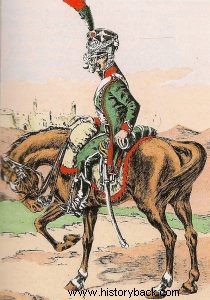
Greek mounted hunter.
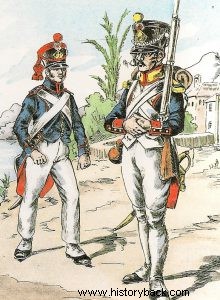
Ionian fusilier and gunner.
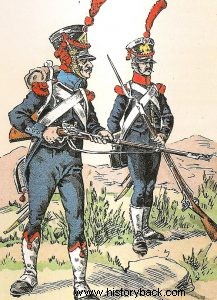
Seven island grenadiers.
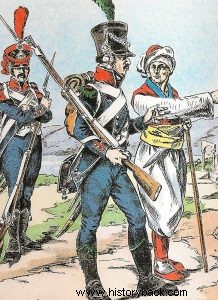
Greek Hunter of the East (middle).
